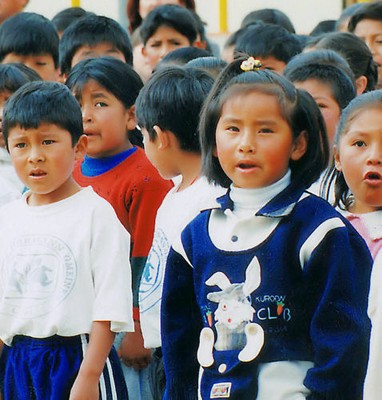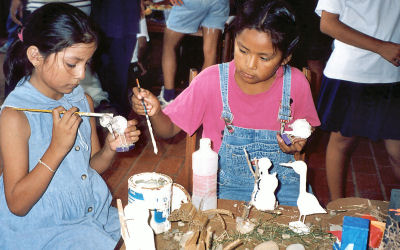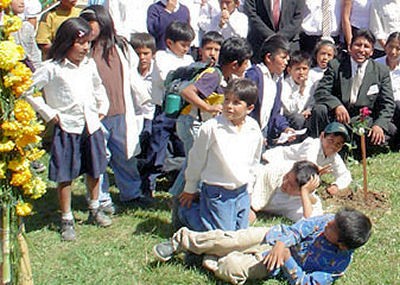SOS Schools in Bolivia
 SOS Primary School Mallasa (La Paz)
SOS Primary School Mallasa (La Paz)
The SOS Primary School opened in 1986 and works closely with state and
local government. There are 16 classes for 450 pupils. As well as
primary education the school offers vocational courses and special
classes for children with learning difficulties.
Update report from 2008:
In a year characterised by the educative transformation of the programme, we can say that we got significant qualitative results related to the quality of the services.
Covenants with some institutions were signed and we stand out the most important ones because of their impact in the educative community: a covenant with the Linguistics Faculty of the San Andres University was signed to develop the teaching of English for children from the nursery school to 8th grade with a greater schedule load than the specified in the study plans of the Education and Cultures Ministry of Bolivia, which suitable qualitative results recognised by the entire educative community.
Likewise, a covenant with the Psychology Career of Del Valle University was signed for a psycho-educational support for children with learning problems.
Also, the children were benefited by the signing of a covenant with CIES (Centre of Investigation, Education and Services) for the development of the Education in Health and Sexuality Programme. JICA (Japanese International Cooperation Agency) is also an ally through the educational technical support developed in order to improve the quality of the educational practice and obviously, the assistance to children in their learning processes.
For the thirteenth time, this year, we carried out the “Mathematic meeting for children”, with the participation of 18 prestigious schools (private and public) of La Paz City, in order to motivate the liking toward mathematics and as a way to look for references to compare their performance in this knowledge area. Six children from the school had outstanding performances in the following positions: two children got the first positions, two children got the second positions and three children got the third positions.
On the other hand, the social character of SOS Children was captured in the reformulation of roles of the School Board of SOS School (representatives of parents), who based their organisation in the one of the Family Committees of Family Strengthening Centres, discarding paradigms regarding a social control only by teachers or principals; these changes addressed their work toward the development of values such as solidarity, pro activity, commitment with the most economically depressed families and co-responsibility with the formation of their children.
Finally, after an intensive qualification process for co-workers, teachers, fathers and mothers, and mainly the support to the entrepreneur projects elaborated by SOS School’s children, the whole process of implementation of entrepreneur education has reached suitable qualitative results, which were shown at the “Expo-demonstration of the First Fair of Children’s Entrepreneur Ideas”. Parents and visitors saw the impact of some projects as they could see some entrepreneur characteristics and features in the children. This process couldn’t have been possible without the reformulation of the methodology and curriculum, elaborating a curriculum of Entrepreneurism, and some other important changes.
SOS Primary School Santa Cruz

The Entrepreneur Education that is part of the educational model of the SOS School of Santa Cruz, involves project teams, teachers, principal and the participant community whose objective is “to form entrepreneur children and youths” with a high commitment to look for the promoting of a entrepreneur culture and therefore, the improvement of their life quality and then, contribute to a real human development in the communities where the programmes are physically present.
This year 2008 was characterised by the meditation about strengthening the work under a Rights Approach, the Education of Tenderness and especially, the Entrepreneur Approach; for that, we worked hard with the methodology of dreams and others that helped to the achievement of the purposed objectives.
Regarding the family and community support for their own appropriation and empowerment, with the educative programmes we had qualification on topics related to the work with children and families in risk or vulnerable and especially, on the way how we can glimpse the topic of Entrepreneurism in them. This is a huge challenge to continue as it’s not easy to change some mental structures or paradigms of an education traditionally competitive, not very motivating and used to discard “those whose performance is not good”.
Since some years ago, we’ve done some qualifications in a systematic way on different topics addressed to the parents and other relatives of the children, responding to their interests or needs detected by the team of the SOS School. This programme made alliances with other similar organisations specialised on different topics, and two new covenants of inter-establishment co-operation were signed. The work with families, with emphasis on promoting the responsibility of the adults in the formation of their children, is significant. For this job, month after month, complete and tidy information of the 528 participant families was facilitated.
It’s important to stand out the situation of emotional and physical abandonment of a greater number of children and adolescents; because of the work conditions of their families, in many cases, the parents travel looking for better job opportunities (in most cases to other countries), and the children stay under the responsibility of relatives or neighbors. This is impacting more strongly every time in the behaviour of the children, who show some aggressiveness, passivity and especially, low motivation to study. Along with the Municipal Children and Adolescents’ Ombudsman’s Office of District 10, support and strengthening programmes were developed to palliate, in some way, the needs of these children and adolescents.
Educationally, we’ve worked with “Vertebral Projects” that allowed to articulate many actions with the different actors. These projects are: 1. Ecological Entrepreneur and of Business, 2. Sport, Good Co-existence and Gender Equity, and 3. Social Projects. Innovative proposals were integrated, such as the methodology of dreams, it means to learn to undertake from individual and collective goals. The results in this field are very encouraging as it allowed us to lead learning processes which are evident in the development of entrepreneur competences. The educational team is constantly upgrading inside and outside the SOS School. We’ve worked with 703 children and adolescents and the school performance has been good. This year, we also had the experience of working with the nursery school and the results were also very encouraging.
In 2009, we expect to improve the educative quality even more and it’s important to work with the linking of the education with the productive and social development of the community. It’s a huge challenge to involve the local educative, prefecture and municipal authorities and other similar organisations in order to work in a combined way in the full implementation of the “Entrepreneur Education” programme.
The SOS Primary School opened in 1999. There are about 760 pupils in 17 classes.
 SOS Primary School Tarija
SOS Primary School Tarija
The SOS Primary School opened in January 2004 and has the capacity for 800 pupils in 16 classes.
An example of the sort of success that the school can have when working with the local community is a young child called "King". “King” practically lived on the streets because of his alcoholic parents. Thanks to the support of his teacher who became involved with and supported his family he went from being aggressive and irresponsible, attending school irregularly and on the point of dropping out to receiving a diploma at the end of the year for his effort and hard work.
Update report from 2008:
The assisted population during this year was 647 children and adolescents who attended the primary school and the first grade of high school.
With the slogan “A Community that got educated with its childhood”, the SOS School was born and in fact, that’s the purpose that has guided all the work with parents who are part of the Community Councils as well as the work in the administrative management, which is now visible in the achievements in a co-responsible way with the educative and collective community.
Thanks to the negotiations of the community with the Municipal Government of Tarija, three very important actions could be done: designation of about Bs. 750.000 (about USD 107.000) for the construction and equipment of 3 classrooms-workshops of technical formation and a lab; assignation of a full item so they could open the first grade of high school (hours paid to the teachers by the State); and assignation of more than Bs. 100.000 (about USD 14.000) for the construction of bleachers in the poli-functional field of the School.
In the educational area, we achieved 100% of the planned activities. For the curricular development, all the students took quality tests and there was a performance evaluation for all the teachers, whose results allowed us to identify the main troubles, but more than anything, the important advances achieved, which corroborate the success of three students in the District’s Math Olympiads (first and third place).
The Entrepreneurism area, among the purposes established in the Entrepreneur Education Programme, which the School is part of, has had a strong impulse and a Coordinator was constituted along with other institutions for the realisation of the Entrepreneurism World Week and a Fair of Entrepreneurism, where some productive and environmental projects were presented and developed by students. There were also external recognitions as the one Jefferson Arancibia got; he is a student from the 6th grade who was appointed as National Deputy of the Children’s Parliament of Tarija City and then was designed as official spokesman of the Children’s Parliament thanks to his leadership and oratory skills.
To finish, it’s important to stand out the fact that although this is the fifth year the school is working, we can see positive attitudes changes in students, families and community, which are evident in the student, family and community “enterprises” this year.

 Return to Schools Wikipedia Home page…
Return to Schools Wikipedia Home page…
